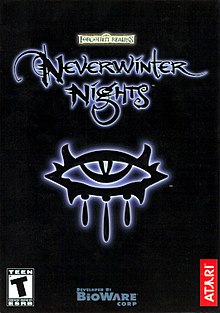
Back ليالي بدون شتاء Arabic نيفروينتر نايتز ARZ Neverwinter Nights Catalan Neverwinter Nights Czech Neverwinter Nights Danish Neverwinter Nights German Neverwinter Nights Spanish Neverwinter Nights Finnish Neverwinter Nights French Neverwinter Nights Galician
| Neverwinter Nights | |
|---|---|
 North American PC cover art | |
| Developer(s) | BioWare |
| Publisher(s) | Infogrames[a] |
| Director(s) | Trent Oster |
| Producer(s) | Trent Oster |
| Designer(s) | |
| Programmer(s) | Scott Greig |
| Artist(s) |
|
| Writer(s) |
|
| Composer(s) | Jeremy Soule Inon Zur (additional music) |
| Series | Neverwinter Nights |
| Engine | Aurora |
| Platform(s) | |
| Release | |
| Genre(s) | Role-playing |
| Mode(s) | Single-player, multiplayer |
Neverwinter Nights is a role-playing video game developed by BioWare. Interplay Entertainment was originally set to publish the game, but financial difficulties led to it being taken over by Infogrames, who released the game under their Atari range of titles. It is the first installment in the Neverwinter Nights series and was released for Microsoft Windows on June 18, 2002. BioWare later released a Linux client in June 2003, requiring a purchased copy of the game to play.[1] MacSoft released a Mac OS X port in August 2003.
Neverwinter Nights is set in the fantasy world of the Forgotten Realms campaign setting, with the game mechanics based on the Dungeons & Dragons 3rd edition rules. The game engine was designed around an Internet-based model for running a massively multiplayer online game (MMOG), which would allow end users to host game servers. Up to 64 players could connect to a single server.[2] The intent was to create a potentially infinite massively multiplayer game framework. This game was named after the original Neverwinter Nights online game, the first graphical massively multiplayer online role-playing game (MMORPG),[3] which operated from 1991 to 1997 on AOL.
The original release of Neverwinter Nights includes the game engine, a game campaign that can be played as single player or in multiplayer mode, and on Windows releases, the Aurora toolset used for creating custom content that would run in the same engine. Three expansion packs were subsequently released for the game: Shadows of Undrentide in June 2003; Hordes of the Underdark in December 2003; and Kingmaker in November 2004. BioWare began selling premium modules through an online store in late 2004. The game's success led to a sequel, Neverwinter Nights 2, released on October 31, 2006.
Cite error: There are <ref group=lower-alpha> tags or {{efn}} templates on this page, but the references will not show without a {{reflist|group=lower-alpha}} template or {{notelist}} template (see the help page).
- ^ BioWare (June 2003). "Neverwinter Nights For Linux". Archived from the original on 2010-03-11. Retrieved 2010-03-17.
- ^ Lombardi, Christ (July 2000). "Okay, roleplayers, let's play". Computer Gaming World. No. 192. pp. 75–78.
- ^ Stormfront Studios Honored At 59th Annual Emmy Technology Awards For Creating First Graphical Online Role-Playing Game MCV, January 10, 2008